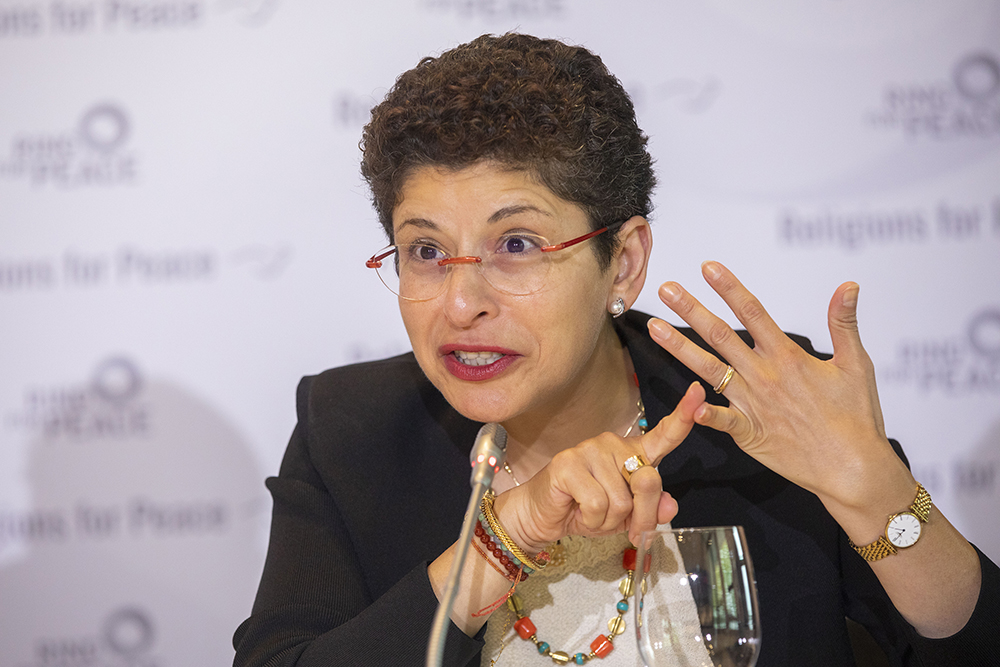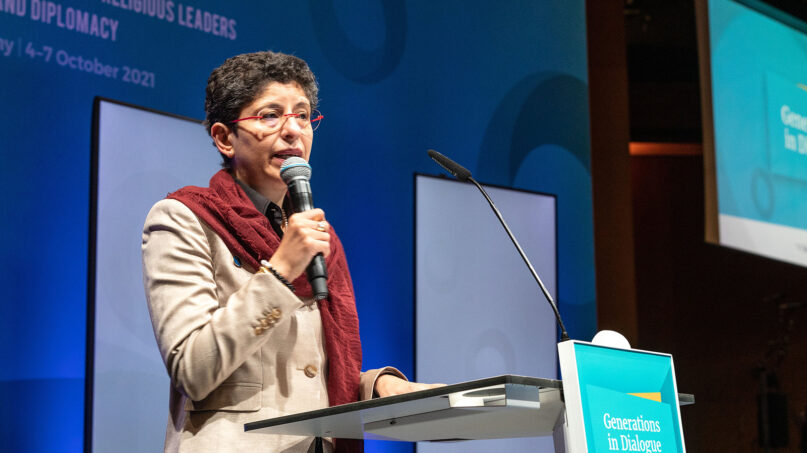(RNS) — In August of 2019, Azza Karam became the first woman and first Muslim to be appointed secretary-general of Religions for Peace, replacing William Vendley, who had led the international interfaith organization and worked for peace across Africa and Asia for more than half of the group’s 49-year history.
Her historic appointment would not be a topic of conversation for long. Within a few months of her taking over, the world was in the grips of the coronavirus pandemic and the staggering death toll and global recession it sparked. This year, the U.S. pullout of Afghanistan brought on political chaos in that country, with ripples around the world.
Karam spoke to Religion News Service’s Eric J. Lyman during the first Religions for Peace conference held at least partially in person since the 2019 edition where she was appointed.
RELATED: Hybrid Religions for Peace conference puts focus on climate, conflict, coronavirus
The former senior adviser to the European Union and the United Nations talked about how her childhood in Egypt prepared her for her role and how religious leaders can confront hot-button topics like peace in Afghanistan and coronavirus vaccine hesitancy.
The interview has been edited for clarity and length.
Have you had time to reflect on the significance of your being the first woman and the first Muslim to head Religions for Peace?
I have thought about it, even if that’s because it would be impossible for me not to see many things from a woman’s point of view, with a woman’s sensibilities. I also think there are things I could do as a Muslim. In my acceptance speech I reached out to Muslim leaders to join the Religions for Peace and there was an immediate positive reaction and many came on board as members of the World Council, our governing board.
I am not serving as a woman or a Muslim, but there has been a remarkable flow of goodwill and a wiliness to work together, whether Catholic, Protestant, Orthodox, Buddhist, Jewish or Hindu.

The new secretary-general of Religions for Peace, Azza Karam, on Aug. 23, 2019. Photo by Christian Thiel/Religions for Peace
What in your past prepared you for this role with Religions for Peace? Or does one just hit the ground running and learn as you go?
As an Egyptian Muslim woman growing up in a very conservative family, it would feel like whatever I did, it was not good enough. That meant I had to work harder, longer, more. The social conditions helped put me in a place where, yes, you have to hit the ground running. If you don’t, you’ll fall flat on your face.
I also feel like my personal history has made me a bit more sensitive to the struggles of those who cannot articulate their thoughts or who aren’t allowed to speak freely — men or women, or people of different races, faiths, social classes. I think there is an added layer of sensitivity, precisely because things didn’t come easy for me. It means I’m naturally on the lookout for those who may be in the same boat.
You must have felt like you were being tested over the last two years, with the pandemic and all its impacts, then what happened in Afghanistan?
As a person who is constantly wondering and seeking, it helps to build a certain sense — not so much of fatalism, but of preparedness, of understanding that things are going to be difficult before they get easier. One of the things I’ve learned in my life, and I’m now in my mid-50s, is that there is joy in service. This belief in service is a great source of encouragement and energy that I sometimes tap into.
Religions for Peace is based in New York, you are from Egypt and your university job is in the Netherlands. Where do you consider home?
That’s a good question. Right now and for the past several years I would say my home is in the U.S., especially New York.

Religions for Peace Secretary-General Azza Karam speaks during the opening ceremony of the Religions for Peace Conference of the World Council of Religious Leaders on Faith and Diplomacy, Oct. 4, 2021, in Lindau, Germany. Photo courtesy of Religions for Peace
The biggest news story this year may be the takeover by the Taliban after the U.S. withdrawal from Afghanistan. What is the role of religious leaders there?
We are living in an age where religion, religious leaders, religious ideologies, are playing an important political, social, cultural and even economic role. I’m not just talking about the spiritual space here. I’m talking very practically, about the political and the financial space. In Afghanistan, we have to appreciate how complicated the situation is. We have to remember that every religious leader in Afghanistan is not part of the Taliban. There are religious minority leaders and communities. We have to look at all of that rich tapestry of religious context in Afghanistan.
At a minimum, Afghanistan forces us to be discerning about the different religious roles, responsibilities and influences. We can no longer speak about “religion” in the singular. We have to be more discerning about society, politics and about the different religions coexisting.
Some evangelical churches in the U.S. are calling on their congregations to avoid the coronavirus vaccines. What is the best way to confront that problem?
There are many religions and many, many religious people. The number of those within those groups who are speaking out against the scientific evidence is relatively small. If we look at the broad group of religious institutions, whether Christian, Muslim, Hindu, Sikh and so on, we realize a large majority is actually calling for a scientific perspective regarding vaccines. There’s a great deal of thought that taking vaccines is actually almost a religious obligation. We just have to keep advocating.





